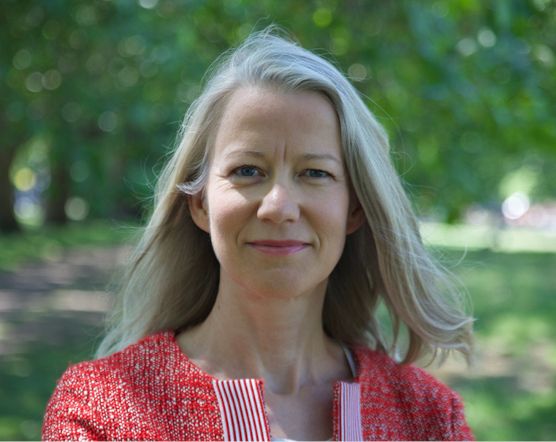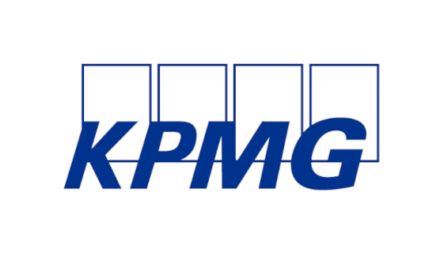
At COP27, Rishi Sunak said: “Climate security goes hand in hand with energy security. Putin’s abhorrent war in Ukraine is not a reason to go slow on climate change, it is a reason to act faster. Investing in renewables is the way to insure ourselves against the risks of energy dependency.” That was a clear message to the world, that we must continue to prioritise transition to clean energy. HMA Anna Clunes talks to the BPCC about how the UK and Poland can cooperate more closely to tackle climate change.
This year’s climate-change summit in Egypt seemed low key compared to COP26 in Glasgow, where, under the UK’s presidency, the meeting led to several significant pledges being made. Over the intervening year, what steps has the UK taken to meet its commitments made in Glasgow? What progress is the British government proudest of?
The Glasgow Pact adopted at COP26 was indeed a historic one, with all 197 parties agreeing to urgently keep the 1.5C goal within reach, and we are rightly proud of the role we played as COP presidents. We are particularly proud that when the UK took on the presidency, just one third of the global economy was committed to net zero and when we handed it over to Egypt that figure was 90%.
It is true that we had to work hard to keep the 1.5C goal alive at COP27, and we were disappointed not to make progress on fossils fuels, but importantly the deal in Egypt preserves the historic commitments countries agreed to last year. We are proud of all our achievements at COP26, and were pleased to see progress on implementation for many of the initiatives agreed in Glasgow at COP27. These include the mitigation work programme, the Glasgow-Sharm El Sheikh work programme on the Global Goal on Adaptation, ad hoc work programme on the new post-2025 finance goal, and an agreement that will enable the Santiago Network on Loss and Damage to get up and running.
Progress was made across all of these, with the legacy of Glasgow and the UK successfully assured.
Back in 2020, British and Polish ministers endorsed the Clean Growth Partnership. How is it developing and what is the current focus?
Indeed, there is already a lot of collaboration between the UK and Poland on renewable energy but there is more we can do to grow the Clean Growth Partnership. As part of it, we shared our best practice on a number of clean energy solutions including offshore wind, civil nuclear, and electromobility. We had an intense programme of bilateral engagements at the highest levels and inward study visits which helped to strengthen of bilateral work on clear growth.
It was great to see Poland endorse four declarations on phasing out coal, just transition, zero emission vehicles, and forestry at COP26 in Glasgow. Since then, our focus has been on delivering on our commitments made in Glasgow. Recently, given Russia’s brutal and illegal invasion of Ukraine, minds have been focused on the subsequent increase in energy prices and ensuring that citizens stay warm this winter. However, I think this gives us even more reason to work together, especially as we believe that energy security and climate action are complementary, and one will help us achieve the other.
The UK has a clear vision for how we will transform the production and use of energy, in a decisive shift away from expensive fossil fuels. Our plan is to produce 95% of our electricity from low-carbon means by 2030 and achieve a net zero economy by 2050. With this, we have developed expertise that we can share, and we are doing this.
In the long term, Poland’s decarbonisation strategy – focused on nuclear power, offshore wind and other forms of renewable energy – offers huge opportunities for investors. Where do you see the biggest chances for UK firms, and what unique expertise do they have to offer Poland?
Our Polish partners value our low carbon expertise, and there is a lot we can share. Our companies offer cutting edge technologies and valuable expertise within renewable energy or civil nuclear that could help Poland accelerate its energy transformation plans. Let me focus on two – offshore wind and civil nuclear.
Offshore wind is our success story for the UK and a number of UK companies are keen to participate in Poland’s offshore programme. Our world-leading offshore wind energy market is full of businesses renowned for their expertise and a well-developed supply chain. They are reliable partners which have the expertise and capital. More importantly, they are complementary to Poland’s capabilities in this sector, including engineering services and underwater cables.
And civil nuclear is another promising area for collaboration. Small modular reactors (SMR) are advanced clean energy solution which can deliver cost competitive and scalable net zero power for multiple applications. Here again, UK businesses have extensive expertise, particularly in the SMR technology that is critical to developing clean and affordable nuclear solutions.
Let’s focus briefly on the Polish investments in the UK. For example, there’s the acquisition by TF Kable Group of JDR Cable Systems, a leader in manufacturing products for some of the world’s largest offshore renewable energy projects such as the London Array wind farm. Could you tell us a bit more about it?
On 8 November JDR Cable Systems (part of TFK Group) celebrated the start of construction of the new state-of-the-art subsea cable manufacturing facility in Cambois, near Blyth, Northumberland. The initial investment project is estimated at £130m, will create 170 high-quality local jobs on completion and safeguard 270 jobs at JDR’s existing facilities.
This investment is part funded by a grant from the BEIS Offshore Wind Manufacturing Investment Support scheme and supported by a UK Export Finance Export Development Guarantee. When complete, the facility will include a new catenary continuous vulcanisation line, making it the only facility in the UK capable of full start-to-finish manufacturing of high voltage subsea cables for offshore wind farms to support the growing global renewable energy market.
This project contributes to UK’s commitment to the net-zero vision, at the same time, the facility fits with the government’s ‘levelling-up’ agenda in North East England, as well as its ‘Build Back Better’ ambition in the wake of COVID-19, helping to deliver on a number of strategic national priorities.
I had the opportunity to visit the TFK production facility in Bydgoszcz in May – thanks so much to them for showing me what they do.
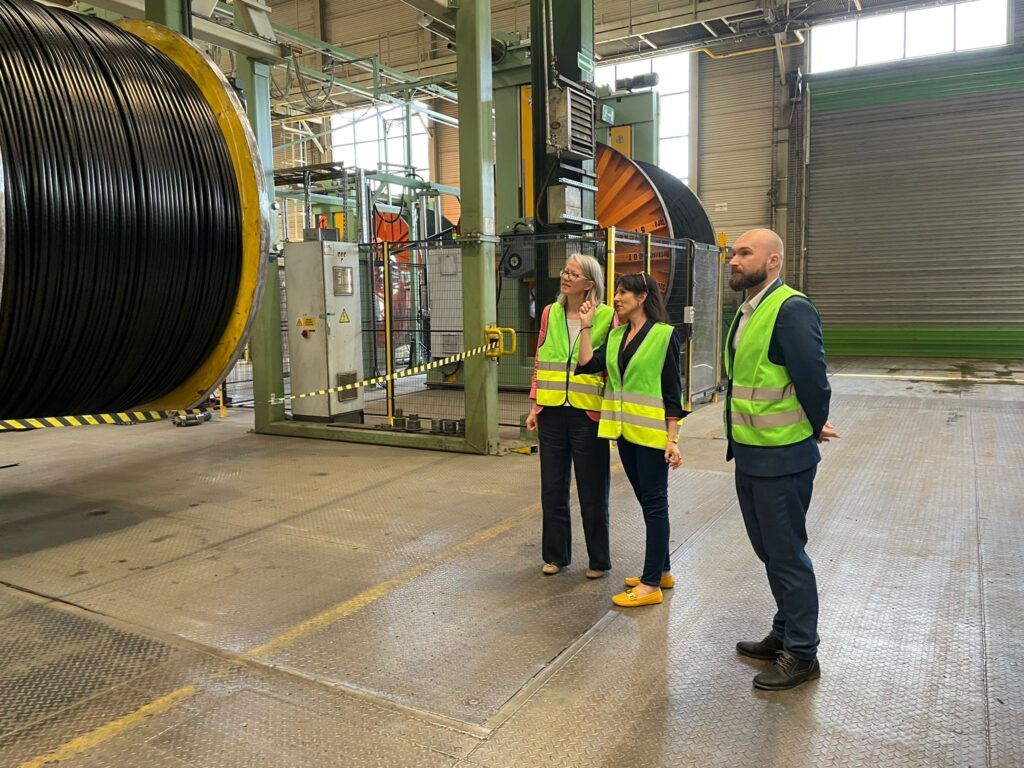
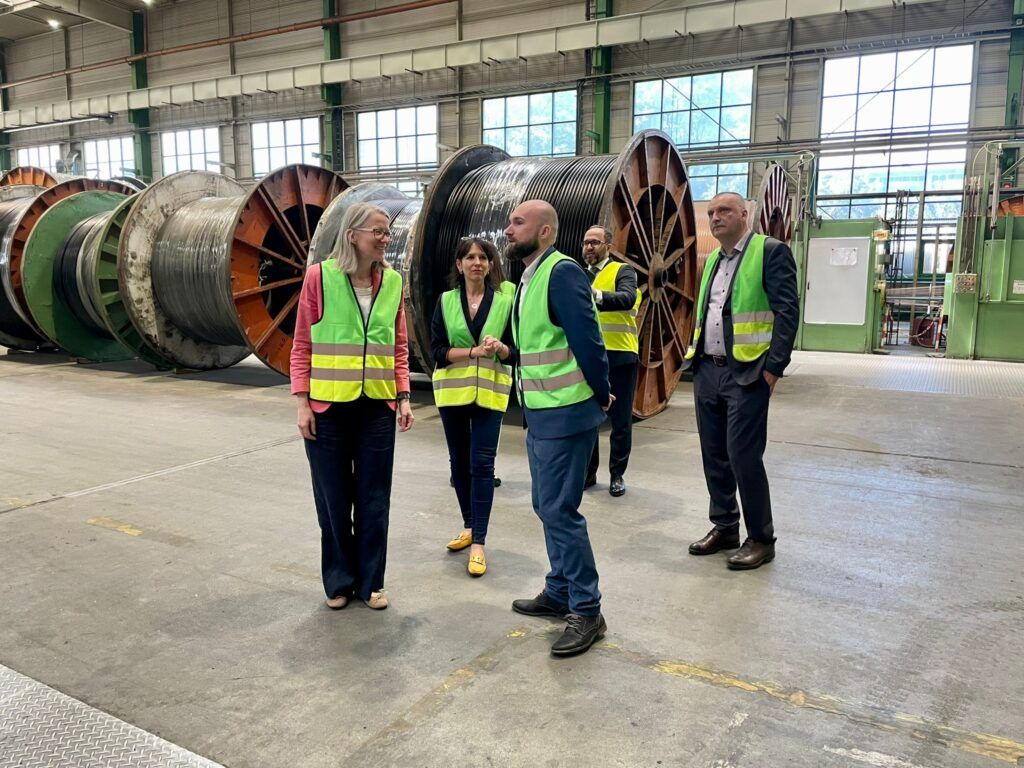
Public procurement has traditionally been a major obstacle for British businesses interested in large contracts in Poland. What can the Embassy do to help them win? What should the Polish government be doing to make the process more transparent – and more beneficial to the taxpayer?
Different countries approach procurement in slightly different ways but having dealt with this issue over the years we believe the key to succeeding in Polish public tenders lies in understanding and acceptance of the local rules, rigorous preparation, and meeting all requirements – however tedious they may seem. For companies bidding from outside of Poland this usually means partnering with a local advisor or law firm, which we strongly recommend. UK bidders need to accept that in Poland they need to follow Polish rules that cannot be altered on a case-by-case basis. But the recent success of Foster+Partners in the tender for Master Architect of the Solidarity Transport Hub as well as our participation in key defence programmes are excellent examples that British bidders can succeed in Polish tenders – with the right preparation and mindset.
Changing the culture of Polish procurement by embedding the British ‘lifecycle cost approach’ is a process that takes years but in order to help UK companies secure wins here and now, we simply need to provide honest advice to them. The role of the Embassy – and the Chamber – is therefore to continue to educate British companies about the local rules and I know we’ve been doing this through many seminars and publications. In fact, we have a guide to Polish procurement coming up, in which we address many of the usual issues British companies struggle with. We’ll be launching it together with the DWF law firm shortly after Christmas so please help us spread the word!
The embassy has been active outside the core government stakeholders on the Race to Zero Campaign launched at COP26. Have more Polish towns and cities joined the Cities Race to Zero? How many businesses are now on board with Businesses Race to Zero?
The Glasgow Climate Pact emphasised the importance of collaboration across sectors and all parts of society to deliver effective climate action. As all those who make and shape our economies and societies have a role to play in the implementation of the Paris Agreement.
In this sense, the Race to Zero Campaign has been central to our engagement with non-government stakeholders. The campaign urges businesses, investors, cities and regions around the world to commit to reaching net zero by 2050 at the very latest. The benefit is clear – to prevent future threats, create jobs, and unlock inclusive, sustainable growth.
My team and I have been travelling around Poland to promote the campaign and encourage signatories from Poland. I’m very proud that a number of Polish entities signed up for the campaign, including 12 cities, two universities and a business, and a further 12 businesses have already started the process. We all need to show green credentials and we are seeing an appetite for more. In response to that, we have recently organised dedicated meetings for businesses in Poland to learn how to calculate carbon footprint in three scopes and the Science-Based Targets initiative. There is also a growing interest from Polish universities who aspire to join the Campaign. In September, together with the Conference of Rectors of Academic Schools in Poland, we organised a workshop dedicated to the campaign based on case studies from UK universities.
I strongly believe we will be soon able to announce new members from Poland.
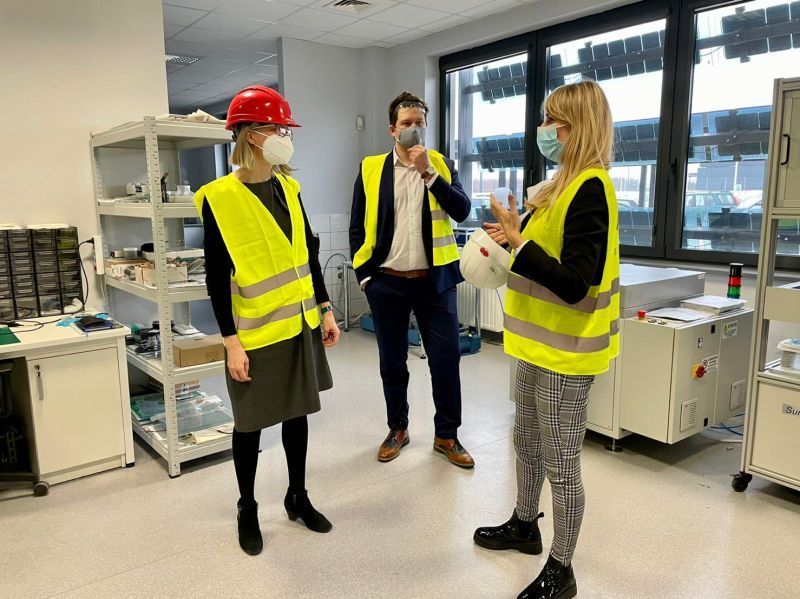
Q7. The future of the Solidarity Transport Hub looks uncertain. Whether Poland needs a mega-airport is questionable, but there’s no doubt that a high-speed rail network is crucial to Poland’s low-carbon future development. What can you say about this flagship project’s long-term prospects?
We believe this is an exciting project that will revolutionise domestic and international transport in Poland. UK companies have been involved in the Solidarity Transport Hub since it was announced in 2017. In 2020, the UK and Polish Governments signed a Memorandum of Understanding on joint cooperation on that investment. As I mentioned earlier, just a few weeks ago, the company behind STH awarded the contract for the master architect services to the UK company – Foster & Partners – known around the world as a top-class designer. It was a real privilege to attend the contract signing – held at another Foster & & Partners project, the top of the Varso Tower! This is one of the most crucial tenders in the whole process as this will determine the final shape of the intermodal hub and we are so pleased to see it go to a UK company. Other UK companies have also been successful in this project including Arup and Jacobs.
I am a firm believer that UK expertise in delivering complex transport projects can help make this challenging infrastructure initiative a success. The project will be delivered in phases, using the latest technologies, including those aimed at reducing CO2 emissions. I am proud of the UK’s involvement in the project, and it is a symbolic landmark of our partnership at this stage.
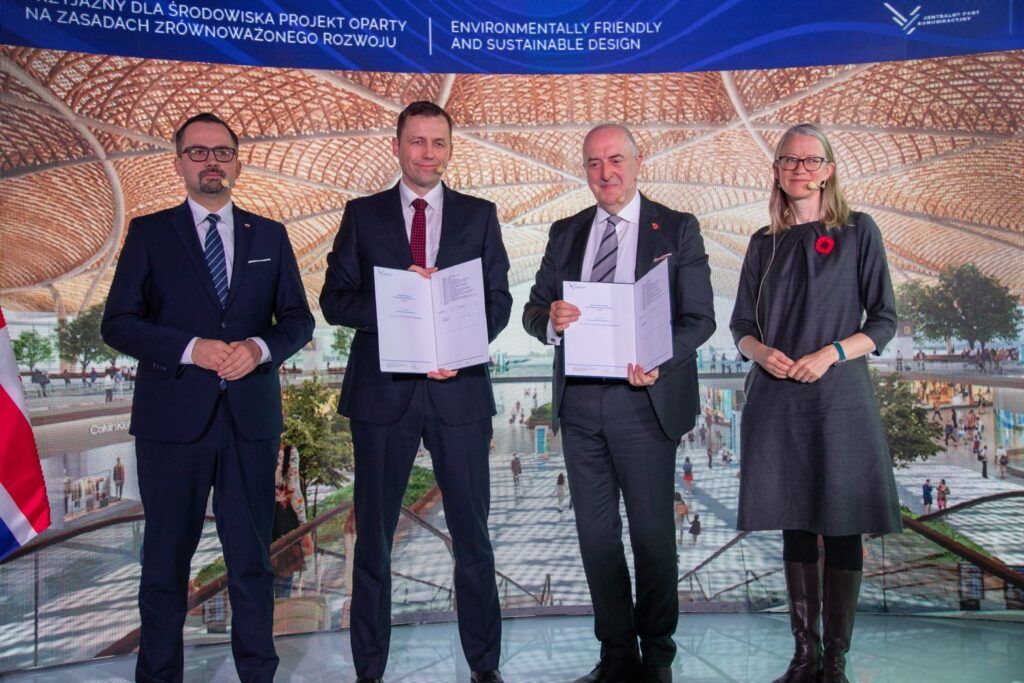
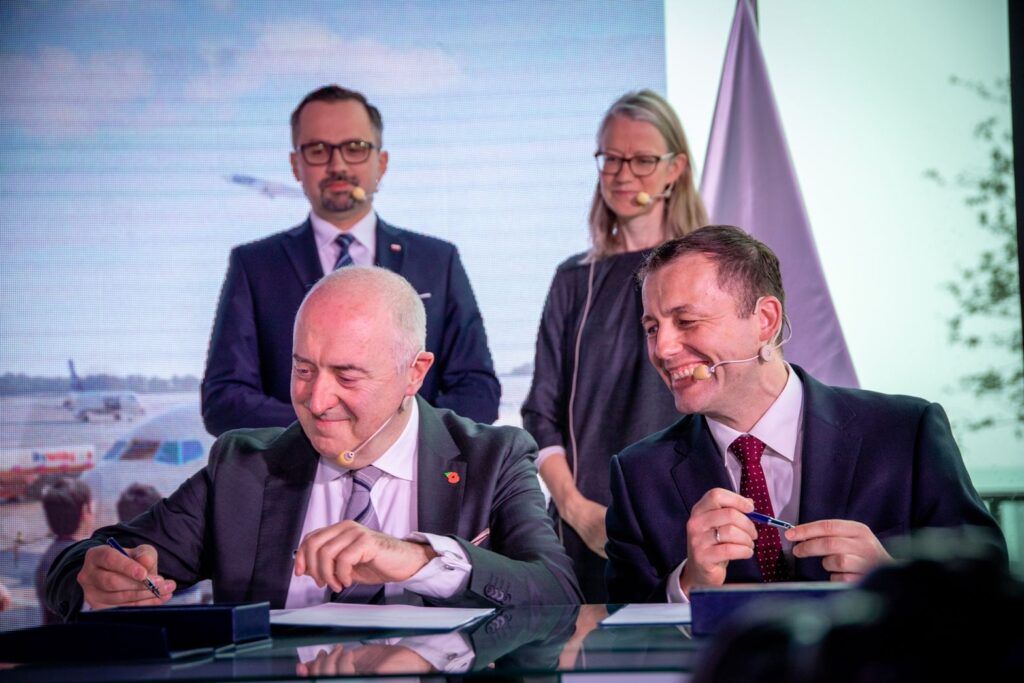
You made the point last year that the changes we all need to make in our lifestyles and behaviour will be critical to holding back climate change; we need to be aware of our personal carbon footprint and the steps we can take to live and consume in a way that generates less emissions. What should governments – and indeed businesses – be doing to get this message across?
You are right, we all have part to play to prevent catastrophic climate change. The science says that we must keep the goal of 1.5C alive and we need to do more to achieve this.
Processes like COP are important, and we’re very proud that our presidency year has driven action and ambition with our global partners and resulted in a further 25 new Nationally Determined Contributions being submitted and seven long-term strategies published since COP26. But this is only part of the solution. Governments, businesses and individuals all need to play their part. That is why UK-Poland collaboration on clean and secure energy, and initiatives such as Race to Zero are so important, and areas I will continue to champion.






